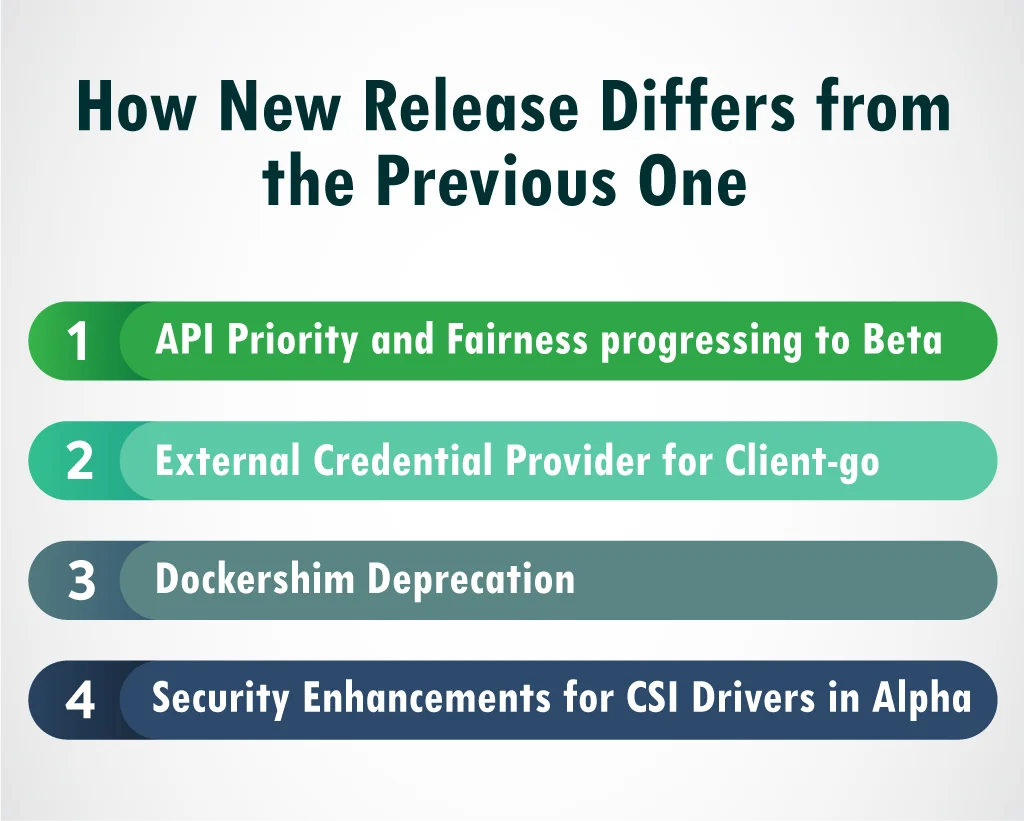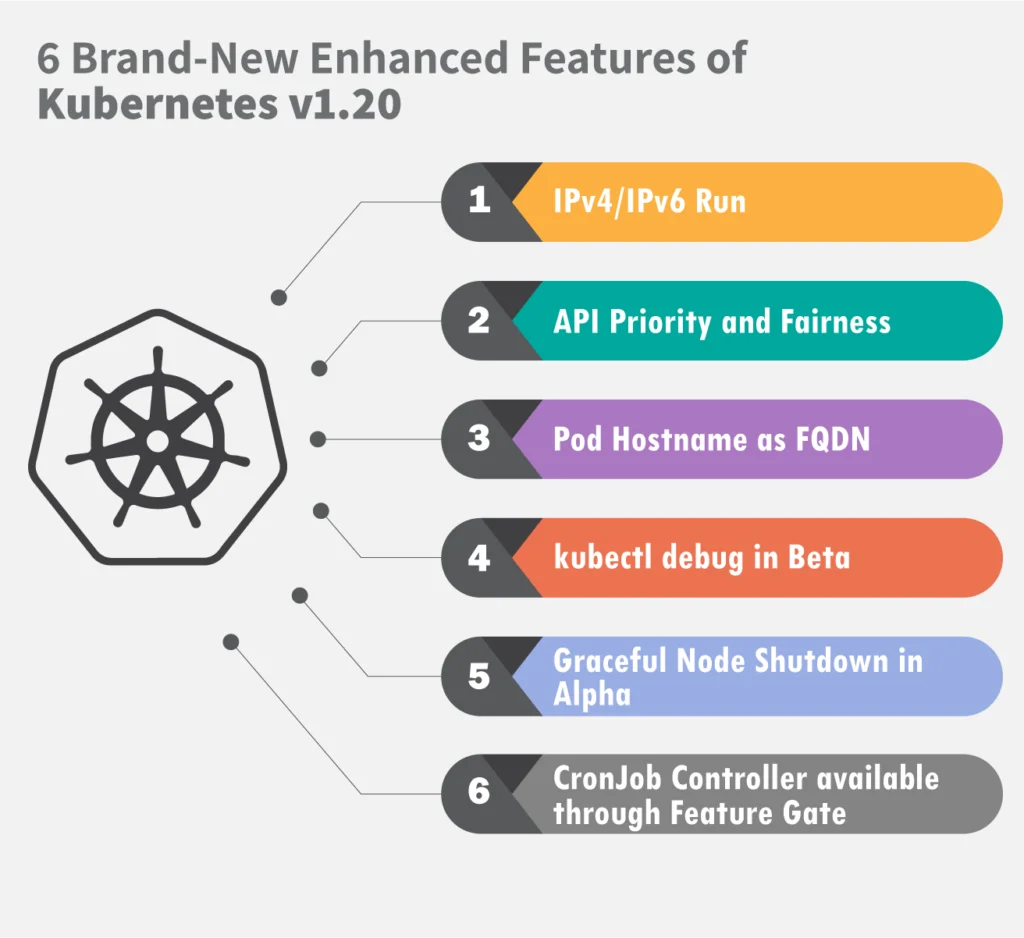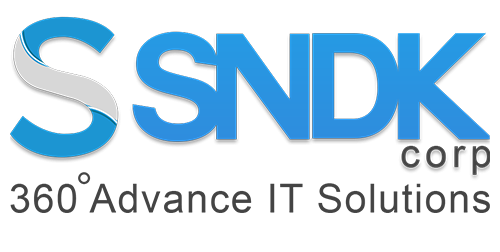Yes, the images generated from the docker build will work in all CRI implementations. The existing images will work exactly in the same manner.
Blog
6 New Feature Updates in Kubernetes v1.20 Release
Introduction – Kubernetes New Releases
The latest release of Kubernetes, Kubernetes 1.20, termed as ‘The Raddest Release’ was announced in the year 2020 as the third and final release. This release comprises 42 enhancements; out of which, 11 enhancements have graduated to stable, 15 are moving to beta stage and 16 enhancements are entering alpha. It consists of more alpha enhancements than stable enhancements. The Kubernetes innovation cycle is gravitating upwards, so there is still much more to delve into in the cloud ecosystem. Some of the Major Themes introduced are: Kubectl Debug moved to Beta, Stable Volume Snapshot Operations, API Priority and Fairness in Beta stage, and many more. Moreover, some of the Major Changes are Exec Probe Timeout Handling and Dockershim Deprecation.
Kubernetes 1.19 is the second release of 2020 consisting of the longest release cycle of 20 weeks in total. It covers 34 enhancements: out of which, 10 enhancements are graduating to stable, 15 enhancements are currently in beta stage and 9 enhancements are in alpha stage. Some of the Major Themes of this Kubernetes Release are Storage Capacity Tracking, CSI Volume Health Monitoring, and many more.
The first and foremost Kubernetes Release was Kubernetes 1.18 known as Fit & Finish Release. This release encompasses 38 enhancements in total; of which, 15 enhancements are graduating to stable, 11 and 12 enhancements are in beta and alpha respectively. The primary focus was made into beta and stable, along with a few exciting new functionalities to ensure a better experience for users. Some of the Major Themes announced in this Release are: Windows CSI Support alpha for Kubernetes, Kubernetes Topology Manager graduated to Beta and many more.
How New Release Differs From The Previous One
Some of the New Major Themes have been proposed in the New Release since the Kubernetes Release v1.19.0.

- API Priority and Fairness progressing to Beta: Kubernetes 1.20 enables API Priority and Fairness (APF) by default which permits kube-apiserver to bifurcate incoming requests by priorities levels.
- External Credential Provider for Client-go: The Credential Plug-ins for the Client-go can now be passed in the current cluster information through the KUBERNETES_EXEC_INFO environment variable.
- Dockershim Deprecation: Docker is being deprecated as an underlying runtime. Docker-produced images are said to continue in your cluster along with all runtimes, as usual.
- Security Enhancements for CSI Drivers in Alpha: A new alpha feature known as CSIServiceAccountToken is introduced in Kubernetes Release 1.20. This feature enables the CSI drivers to imitate the pods that they mount the volumes for. It improvises the security posture in the mounting process and is crucial for secret-handling CSI drivers.
Two Major Noticeable Changes in Kubernetes v1.20
Some of the outstanding features in the new release of Kubernetes v1.20 which are majorly noticeable and deliver an incredible experience to users are as follows:
- Kubernetes Command-Line Feature moves to Beta: This feature maintains debugging workflows directly from kubectl. It is a command-line tool that allows users to execute commands against its clusters. Following are the troubleshooting scenarios supported by Kubectl Debug:
- Adding a brand-new container with debugging tools.
- Designing a replica of the units of computing that utilize a different container image.
- Creating a container running in host namespaces for troubleshooting on a node.
- Volume Snapshot Operations: Volume Snapshot Operations are triggered and incorporated in a standard way, which has been made stable in Kubernetes v1.20 Release. Users can now use the operations on any Kubernetes environment in a convenient way.
6 Brand-New Enhanced Features of Kubernetes v1.20
Here are some of the newly enhanced Major Themes or Features popularized in the latest version of Kubernetes, Kubernetes v1.20:

- IPv4/IPv6 Run: IPv4/IPv6 is being re-implemented in Kubernetes 1.20 to support dual-stack services. You can create services utilizing IPv4/IPv6, provided your cluster has dual-stack enabled.
- API Priority and Fairness: API Priority and Fairness is now enabled by default in Kubernetes 1.20, unlike its behavior in 1.18.
- Pod Hostname as FQDN: SetHostnameAsFQDN was previously introduced in Kubernetes 1.19, which is now enabled by default in the current version.
- kubectl debug in Beta: kubectl debug incorporates support for common debugging workflows straightaway from kubectl. Troubleshooting works by creating a copy of the pod that uses a separate command or container image.
- Graceful Node Shutdown in Alpha: GracefulNodeShutdown feature allows kubelet to get completely aware of node system shutdowns. This, in turn, enables exquisite termination of pods during a system shutdown.
- CronJob Controller available through Feature Gate: Kubernetes v1.20 supports an alternative functionality of the CronJob controller as an alpha feature. It uses informers delivering an experimental performance improvement.
Other Noticeable Enhancements – Kubernetes v1.20
Some other significant noticeable enhancements observed in the latest version, Kubernetes v1.20 are:
- PID Limits moves on to General Availability (GA).
- Non-Recursive Volume Ownership (FSGroup) progresses to Beta.
- Runtime log sanitation.
- Removal of deprecated flags in kubeadm.
- TokenRequest/TokenRequestProjection and RuntimeClass functionality graduates to General Availability.
Wrapping Up
According to the latest survey, 83 percent of respondents are currently using Kubernetes in production. There are few completely new functionalities in the new version of Kubernetes, Kubernetes v1.20 like Security Enhancements for CSI Drivers in Alpha. Some of the features are re-implemented from the older versions with some further innovations. The newly invented innovative and stable features in Kubernetes 1.20 will surely keep on progressing the trend.
Consult SNDK Corp for more details and IoT cloud security services.
FAQs
Yes, you can use Docker in Kubernetes 1.20. The only change is a single warning log printed at kubelet startup during the runtime of Docker.
